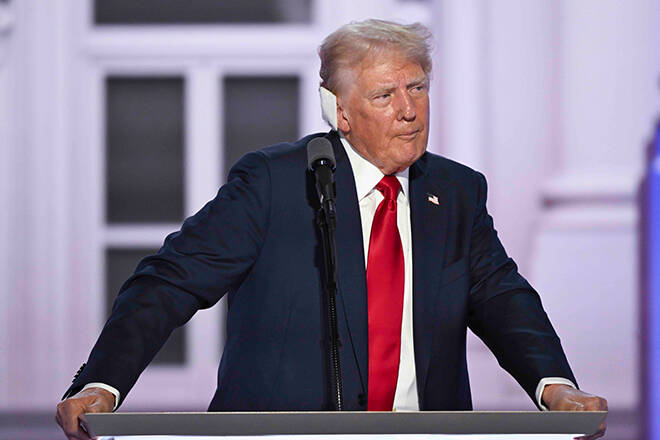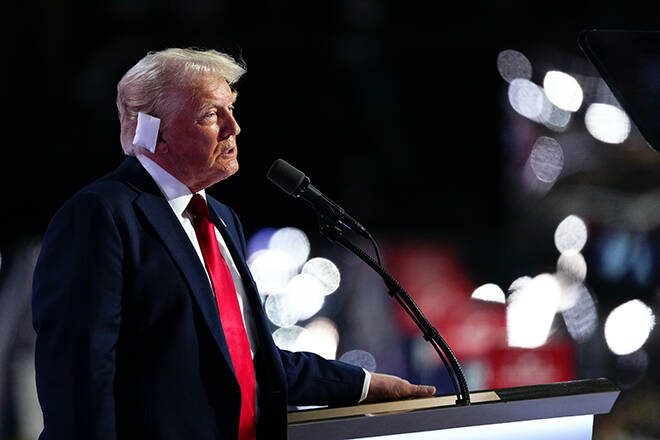Accepting the Republican nomination, Trump preaches unity, then reverts to attacks

KENNY HOLSTON / NEW YORK TIMES
Former President Donald Trump, the Republican presidential nominee, speaks on the fourth and final night of the Republican National Convention at the Fiserv Forum in Milwaukee, today.

JAMIE KELTER DAVIS / NEW YORK TIMES
Former President Donald Trump, the Republican presidential nominee, speaks on the fourth and final night of the Republican National Convention at the Fiserv Forum in Milwaukee, today.


MILWAUKEE >> Former President Donald Trump accepted the Republican presidential nomination for the third time tonight with a speech that opened with a somber appeal to unity before reverting to a divisive and rambling list of grievances and attacks on his political opponents.
Speaking publicly for the first time since an attempt was made on his life, Trump — who frequently mocks his political enemies, has promised retribution against them and often insists this election is the country’s “final battle” — called on Americans to put aside their political differences and come together.
But he quickly made it clear that his version of unity was one in which the country turned to him for leadership and cast his opponents aside, accepting that he had wrongfully been targeted by corrupt forces.
“We must not demonize political disagreement,” Trump said early in his speech at Fiserv Forum in Milwaukee, which clocked in around 92 minutes, the longest convention speech in modern history, shattering his own previous record.
Minutes later, he proceeded to do exactly that, making baseless claims about election fraud and vilifying Democrats as “crazy” and “incompetent.” After spending the better part of an hour unleashing divisive rhetoric about immigrants, his political opponents and the legal cases against him, Trump declared that “as long as our energies are spent fighting each other, our destinies” remain “out of reach.”
Considerable time and effort was put into a Republican convention that softened Trump’s image and portrayed him as the leader of an inclusive political movement. Trump, over the course of four days, basked in stories about “Grandpa Trump” and speakers who marveled at his surviving an assassin’s bullet as part of God’s plan to see him back in the White House. But his remarks brought repeated returns to the familiar us-versus-them themes that delight his rally crowds and were central to his political appeal — and may do little to help him sway the voters at home who have not already been won over.
Don't miss out on what's happening!
Stay in touch with breaking news, as it happens, conveniently in your email inbox. It's FREE!
Trump used violent language to detail his hard-line views on immigration, broadly depicting those crossing the border as criminal invaders or mentally ill. He railed against the criminal cases against him as “partisan witch hunts” by Democrats. And as he did in 2016, he repeatedly decried an America in decay, one that can only be rescued by his restoration to the White House in November.
Republicans entered the convention firmly behind Trump, a stark contrast to the crisis engulfing President Joe Biden and his party as anxious Democrats continue to question his ability to lead the ticket and suggest that he drop his reelection campaign. In the aftermath of Saturday’s shooting, Trump and his campaign insisted that “unity” must be the watchword of the convention.
The beginning of Trump’s speech nodded to that approach. He opened his remarks with uncharacteristic solemnity, soberly describing in detail to a rapt crowd his experience of the assassination attempt that he had survived days earlier at his rally in Butler, Pennsylvania.
Wearing a large white bandage on his right ear, Trump expressed gratitude that he had survived the shooting mostly unharmed. Following years of describing himself as a political martyr, Trump suggested that divine intervention had kept him alive.
“I’m not supposed to be here tonight,” Trump said, sounding genuinely awed. The crowd, which had stayed hushed, stirred, responding with chants of “Yes, you are.”
“Thank you,” Trump responded. “But I’m not.”
And even in the rest of the speech, Trump made small feints toward an effort to calm the volatility that has characterized American politics since his ascent. His prepared remarks avoided directly criticizing Biden, referring mostly to Democrats and “the current administration” as he described their failings.
But Trump, known for veering off the teleprompter into a series of rambling off-script digressions, slipped relatively early in a telling moment in his speech that broke from his own appeal to political harmony. Reviving a now familiar rally contention, Trump said Biden’s name twice as he insisted that the president had done more damage than the 10 worst American presidents combined.
Ammar Moussa, a Biden campaign spokesperson, accused Trump of falling back on the same divisive tropes that characterized his initial presidential run.
“Donald Trump is just playing the greatest hits from 2016,” Moussa said. “He has not changed. He has not moderated. He has gotten worse — except now he talks about the ‘late, great, Hannibal Lecter.’”
Like Trump’s aside likening immigrants to a fictional cannibal and serial killer, much of his convention speech consisted of complaints, promises and attacks familiar to anyone who has attend his rallies this year.
But tonight’s speech was carried in full by major television networks and delivered to a broader audience than Trump has generally addressed this year.
Despite the wider lens, Trump stuck to his usual animating themes. He accused his political opponents of “cheating on elections,” a reference to his continued insistence that there was widespread election fraud in 2020 despite evidence to the contrary.
Trump vowed to conduct the “largest deportation operation” in American history as he accused other nations of deliberately sending “murderers, drug dealers, terrorists and criminals” across the border, an assertion that he has provided no evidence to support.
He conjured up the notion of an “invasion” at the U.S. border with Mexico that was contributing to a surge in violent crime that has not been borne out by available data. He vowed to address inflation by drilling for more oil and natural gas, and he reaffirmed his commitment to an “America first” approach to trade and isolationist foreign policy.
Still, there were some deviations from Trump’s rally speeches that suggested he was aware that today’s convention was an important chance to win over undecided voters in November.
During his speech, Trump — who lost the popular vote both when he won by electoral votes in 2016 and when he lost in 2020 — directly asked Americans who had previously rejected his often vicious brand of politics to reconsider. He singled out Black and Hispanic Americans during his speech, groups he hopes to win from Democrats.
“I am running to be president for all of America, not half of America,” Trump said. “Because there is no victory in winning for half of America.”
And quite likely as part of his bid to win support, Trump did not bring up his stance on abortion or his role in appointing the Supreme Court justices who helped overturn Roe v. Wade, an achievement he proudly claims credit for on the trail.
On the whole, the convention reflected his total grasp on the Republican Party and the extent to which it has forcefully coalesced behind him at an extraordinary moment in modern political history.
Trump formally became his party’s standard-bearer as a twice-impeached, four-times-indicted convicted felon, developments that never caused Republicans to significantly waver. And the assassination attempt quashed any remaining intraparty dissent, at least for now, over how his politics had so wholly supplanted decades of conservative orthodoxy.
The schedule of speakers who took the stage this week further displayed just how significantly Trump has driven his dissenters away from the party’s center. They included longtime adherents and those who backed him in 2016, former staff members who stuck with him and a number of converts testifying about how misguided their initial disdain for Trump’s populist and often incendiary politics had been.
Those onetime detractors included ordinary Americans who said they had ditched their allegiance to Democrats, preferring Trump after years under Biden’s leadership. But their ranks also included Trump’s freshly chosen running mate, JD Vance, a novice senator from Ohio whose rapid political ascendance hinged on his transformation from sharp Trump critic to ferocious defender.
And in a further display of how politics has become the Trump family business, Trump’s family members were some of his strongest surrogates, previewing his speech by sharing their own emotional recollections of the moment they learned that Trump had been shot at.
In another show of unity, Trump’s wife, Melania, and his older daughter, Ivanka, both attended his speech tonight after being all but absent from the campaign trail, though neither of them spoke from the stage.
—
This article originally appeared in The New York Times.
© 2024 The New York Times Company

 Stay updated on Hawaii and national elections coverage
Stay updated on Hawaii and national elections coverage

